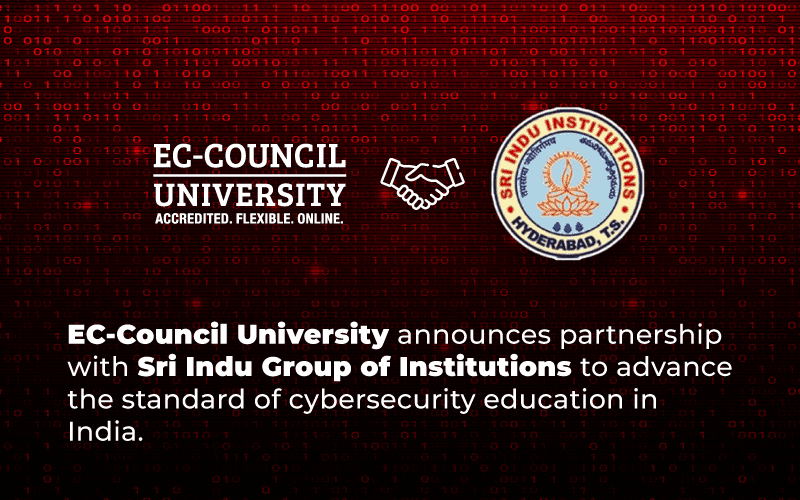The world is evolving rapidly, and the way we are transferring, consuming, and utilizing information is also changing. We are on the cusp of a revolution, a new dawn, where traditional learning is dawdling behind, and hands-on learning can help us adapt to this transition. Our students at EC-Council University are already reaping its benefits.
One of the key differentiators between our programs and the traditional bachelor’s and master’s degrees is that our new-age degree programs prepare students for the real-world environment with the help of simulations and projects. So, their first day in the office doesn’t have them looking lost. To make our courses industry-relevant, we use hands-on learning techniques, which play a vital role in preparing for the challenges ahead. The average age of our students is 36, indicating that cyber security professionals understand the need for upskilling from time to time.
So, what is Hands-On Learning?
Hands-on learning is a form of education in which students learn by doing, rather than memorizing, from textbooks. Instead of depending on an instructor or professor, they engage with the subject matter to solve problems and create something new.
At EC-Council University, we use iLabs to reinforce learning by offering a simulated environment with over 400 complete exercises covering Ethical Hacking, Computer Forensics, Penetration Testing, Secure Coding, and even Disaster Recovery!
Our students get to face real-world cyber threats in the most secure environments, and this experiential endeavor immerses them in the environment and prepares them better than any textbook or lecture.
Is Hands-on Learning beneficial?
Yes, research indicates that learning by immersing in activities offers better practical implementation strategies compared to teaching lessons in a traditional classroom setting.
Some advantages of hands-on learning techniques are:
- Hands-on learning creates one of the most engaging learning environments.
- This technique develops critical thinking skills of students because it requires students to choose and decide to receive outcomes, and the outcomes shape the learning experience.
- Real-world experience and knowledge gets translated. Individuals engage, practice, and visualize better to develop necessary skills and use their learning in real-world settings.
- With this method, individuals can find different and more creative ways to find solutions.
- Real-world equipment and material is used to design hands-on learning experiences.
What are the benefits of Hands-on Learning for a student of Cyber Security?
Hands-on learning is probably one of the best ways to learn Cyber Security, considering we continue to face unprecedented challenges daily. Joe Biden, President of the United States, expresses the challenge of cyber threats we face, “You know, we’ve seen how cyber threats, including ransomware attacks, increasingly can cause damage and disruption to the real world. I can’t guarantee this, and you’re as informed as I am, but I think it’s more likely we’re going to end up — well, if we end up in a war, a real shooting war with a major power, it’s going to be as a consequence of a cyber breach of great consequence. And it’s increasing exponentially — the capabilities.”
Hence, traditional forms of education are inadequate to prepare cyber warriors for tomorrow. We need to continue to learn and implement in real-time to stay updated and stay relevant.
We recently conducted an alumni survey. Our findings show that 83% of our alumni students benefited from iLabs and that they have taken great strides in their careers. Our survey also shows how important hands-on learning is.
Is Cyber Security still a profitable career path to pursue in 2021?
The US Bureau of Labor Statistics predicts Cyber Security jobs will grow 31% through 2029, over seven times faster than the national average job growth of 4%. This is not only true for the United States, but is the case around the globe. So, we can safely say that Cyber Security is an extremely profitable career path.
Why should you get an online Cyber Security Degree?
An online Cyber Security degree from EC-Council University comes with a host of benefits. It is flexible, allowing you to complete your degree while working full time and offering value for your time. You get to interact with university faculty and batch mates from around the world. You not only get to grow your network but also learn from the best, regardless of your location.
We understand that modern students need to be industry-ready; hence, all of EC Council’s relevant industry certifications have been included in the various specializations.
Candidates aspiring to make a career in Cyber Security can choose either Bachelor of Science in Cyber Security (BSCS) degree or a Master of Science in Cyber Security (MSCS) or any of the Graduate Certificate Programs in Cyber Security that EC-Council University offers.
Found this article interesting? Follow EC-Council University on Facebook, Twitter, Instagram and LinkedIn to read more exclusive content.








